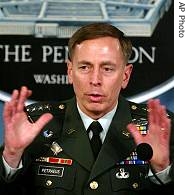-
(单词翻译:双击或拖选)
Washington
30 April 2007
The ongoing1 surge of additional U.S. troops in Iraq will soon enter its third month, and while sectarian violence is down in Baghdad, progress has been offset2 by an increase in deadly suicide bombings by al-Qaida insurgents3. Middle East and military analysts4 say it is still too early to tell whether the counterinsurgency strategy will succeed. VOA correspondent Meredith Buel has more in this background report from Washington.
More than half of the nearly 30,000 additional U.S. troops that are part of the Iraq security plan have now been deployed5, and the rest are scheduled to arrive before the end of June.
The senior U.S. commander in Iraq, General David Petraeus, sees mixed results so far.
"We are actually ahead of where I wanted to be in some areas, and probably behind where we might have hoped to be in some other areas," said General Petraeus.
 |
| General David Petraeus at the Pentagon, 26 Apr 2007 |
Suicide bombings by al-Qaida insurgents, however, increased 30 percent between mid-February and early April, a troubling trend military strategists fear could reignite sectarian bloodshed.
Frederick Kagan, a military historian and resident scholar at the American Enterprise Institute, says al-Qaida insurgents have increased their attacks in an effort to undermine the Baghdad security plan and erode6 support for the war in the United States.
"The al-Qaida surge is very serious," said Frederick Kagan. "It is very significant. It is altering the situation in Iraq in unpredictable ways. It is clearly further eroding7 America's will to stay the course here and continue to try to win this war."
Most of the new soldiers being sent to Iraq are in Baghdad and many are still conducting operations to clear neighborhoods of insurgents.
U.S. and Iraqi soldiers are setting up dozens of combat outposts and security stations designed to protect Baghdad residents.
Deploying8 U.S. troops on the streets of Baghdad and away from their heavily fortified9 bases has increased their vulnerability to attacks. More than 100 American soldiers were killed in Iraq in April, making it the deadliest month for U.S. troops this year.
Retired10 U.S. Army Captain Andrew Exum, who served as a Special Forces soldier in Iraq and Afghanistan, says exposing troops to greater risks is necessary.
"If you want to actually win the war you have go get out there and make contact with this population," said Andrew Exum. "You have to get out there and make contact with the enemy and you have to disperse11 into these smaller patrol bases. The downside of this is that this is all very hard fighting."
Analysts say it is now critical for the government of Prime Minister Nouri al-Maliki and other Iraqi leaders to make the political compromises necessary for long-term stability.
Michael Eisenstadt, the director of the Military and Security Studies Program at the Washington Institute for Near East Policy, says political progress is critical to sustain gains in security and reduce violence.
"Unfortunately, at this point, that has not yet happened," said Michael Eisenstadt. "There is not measurable progress in my mind on the political front. The political side of this war has not progressed, or the political side of the surge has not progressed to the same extent that the military side has. There are high expectations of the Maliki government, but the payoff has been essentially12 low."
Frederick Kagan of the American Enterprise Institute first proposed the sustained surge of U.S. troops in Baghdad before the Bush administration adopted the policy earlier this year.
Kagan says it is still too early to determine if the counterinsurgency strategy will ultimately succeed.
"The basic conclusion that I would offer you is that victory is still up for grabs," he said. "Those who would say that the war is lost, definitively13, I don't think there is support for that statement in Iraq. I think it is hard. I think we may lose. I think we may win. I think it depends a lot on what we do and it depends a lot on what the enemy does. But I don't think anyone can predict for certain the outcome of this fight at this point."
Kagan argues the surge is a long-term commitment and should last until 2008.
General Petraeus says he will make the first official assessment14 of the new security plan in September.
 收听单词发音
收听单词发音
1
ongoing

|
|
| adj.进行中的,前进的 | |
参考例句: |
|
|
|
2
offset

|
|
| n.分支,补偿;v.抵消,补偿 | |
参考例句: |
|
|
|
3
insurgents

|
|
| n.起义,暴动,造反( insurgent的名词复数 ) | |
参考例句: |
|
|
|
4
analysts

|
|
| 分析家,化验员( analyst的名词复数 ) | |
参考例句: |
|
|
|
5
deployed

|
|
| (尤指军事行动)使展开( deploy的过去式和过去分词 ); 施展; 部署; 有效地利用 | |
参考例句: |
|
|
|
6
erode

|
|
| v.侵蚀,腐蚀,使...减少、减弱或消失 | |
参考例句: |
|
|
|
7
eroding

|
|
| 侵蚀,腐蚀( erode的现在分词 ); 逐渐毁坏,削弱,损害 | |
参考例句: |
|
|
|
8
deploying

|
|
| (尤指军事行动)使展开( deploy的现在分词 ); 施展; 部署; 有效地利用 | |
参考例句: |
|
|
|
9
fortified

|
|
| adj. 加强的 | |
参考例句: |
|
|
|
10
retired

|
|
| adj.隐退的,退休的,退役的 | |
参考例句: |
|
|
|
11
disperse

|
|
| vi.使分散;使消失;vt.分散;驱散 | |
参考例句: |
|
|
|
12
essentially

|
|
| adv.本质上,实质上,基本上 | |
参考例句: |
|
|
|
13
definitively

|
|
| adv.决定性地,最后地 | |
参考例句: |
|
|
|
14
assessment

|
|
| n.评价;评估;对财产的估价,被估定的金额 | |
参考例句: |
|
|
|















